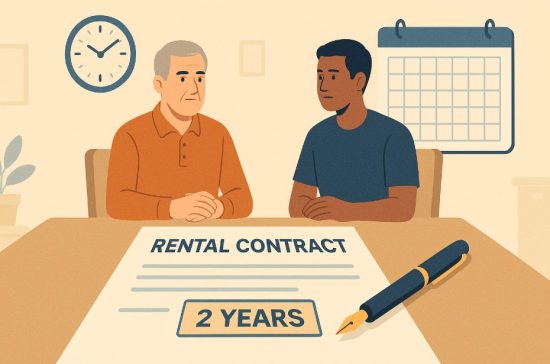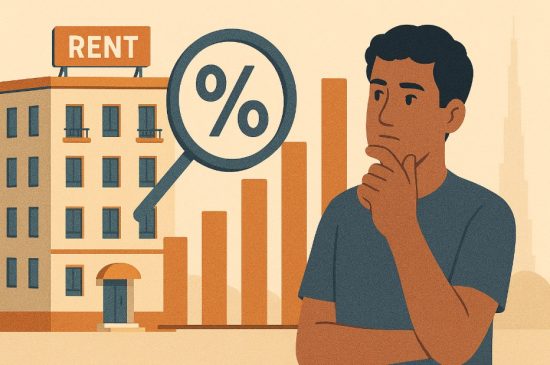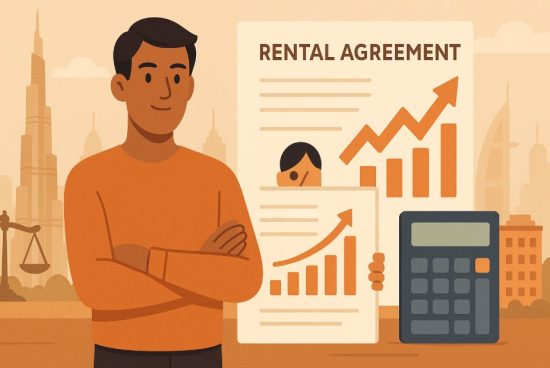
If you’re renting in Dubai, it’s important to understand how and when your landlord can increase your rent. The question of whether a landlord can raise rent after the first year of tenancy is common, especially with the city’s ever-evolving property landscape. Dubai has a structured legal framework governed by the Real Estate Regulatory Agency (RERA), which ensures fairness and transparency in rental agreements.
However, rent increases aren’t automatic or guaranteed each year. Instead, they depend on specific criteria, including how your current rent compares to market averages, the terms of your contract, and whether proper legal notices have been given.
For tenants, this provides protection against sudden or excessive increases. For landlords, it sets clear guidelines on what’s permissible. This blog offers a complete breakdown of what Dubai’s tenancy laws say about rent increases after one year, what rights you have as a tenant, and how to navigate the process in 2025 and beyond.
What Does Dubai Rental Law Say About Rent Increase After A Year?
Dubai’s rental law allows landlords to increase rent after one year, but only under regulated circumstances. The framework for rent regulation is outlined in Decree No. 43 of 2013.
This law governs how much rent can increase depending on the gap between the current rent and the average market rent, as determined by the RERA Rental Index.
The Real Estate Regulatory Agency (RERA) plays a central role in monitoring and enforcing rental law. It publishes the Rental Index, which provides the legal benchmarks for rent values across different areas and property types. This ensures consistency and fairness in the market.
According to the law:
- Rent increases are not automatic and must follow the RERA Index
- A 90-day written notice must be given before implementing any increase
- Rent hikes must stay within the permissible limits set by RERA
These legal measures prevent excessive increases and ensure transparency in landlord-tenant agreements.
Can A Landlord Increase Rent In The First Two Years?

Dubai’s tenancy laws are clear about rent adjustments during the early stages of a lease. Landlords cannot increase the rent within the first two years of a tenancy agreement. This rule provides stability and predictability for tenants and discourages landlords from making frequent rent changes.
Whether the property is residential or commercial, the same rule applies. It ensures that tenants have a financially stable environment for at least two years. This is particularly important for long-term residents and small businesses seeking cost consistency.
Key aspects of this rule include:
- Applies to both residential and commercial properties
- The two years must be completed before any increase can be proposed
- New lease contracts reset the two-year count
By restricting increases in the first two years, the law promotes longer-term tenancies, which also benefit landlords through reduced turnover and vacant periods. Tenants, in turn, enjoy peace of mind knowing that they won’t face sudden financial strain during the initial lease term.
What Are The Legal Requirements For A Rent Increase?
For a landlord to legally raise the rent in Dubai, specific conditions must be satisfied under RERA regulations. These rules aim to protect tenants from unfair treatment and ensure landlords stay within permissible boundaries.
RERA Rental Index Conditions
The RERA Rental Index determines the allowable rent adjustment based on the current rent versus the average market rate for similar properties.
If the rent is close to or above the market average, no increase is permitted. If it is significantly lower, then a rent hike can be applied within specific percentage limits.
- No increase if the rent is within 10% of the market rate
- Increases of 5% to 20% allowed, depending on how far below the market rate the current rent is
- Index is updated regularly to reflect market trends
90-Day Written Notice Rule
Even if a rent increase is justified, landlords must follow due process. This includes giving tenants at least 90 days’ written notice before the lease renewal date. Without this notice, the landlord forfeits the right to increase the rent for that lease term.
Valid notice can be delivered via:
- Registered email with timestamp
- Courier or registered mail
- Official notice through the Ejari system
This rule ensures tenants have time to review, accept, negotiate, or dispute the proposed change.
Dispute Resolution For Unlawful Increases
If the rent hike doesn’t meet RERA’s requirements, tenants have the right to challenge it through the Rental Dispute Settlement Centre (RDSC). This legal channel allows tenants to present documentation and have their case reviewed by an independent authority.
Tenants must provide:
- Current tenancy contract
- Rent payment history
- Copy of the rent increase notice
The RDSC has the authority to overturn unlawful increases and issue legally binding decisions to protect tenant rights.
How Much Can A Landlord Increase Rent In Dubai?

The amount a landlord can increase rent in Dubai is directly tied to how your current rent compares with the market average. This is assessed using the RERA Rental Index. If your rent is already in line with the area average, your landlord may not be permitted to raise it at all.
Here’s how the rental increase is calculated:
- No increase allowed if rent is less than 10% below the market rate
- 5% increase if rent is 11% to 20% below market rate
- 10% increase if rent is 21% to 30% below market rate
- 15% increase if rent is 31% to 40% below market rate
- 20% increase if rent is more than 40% below the market rate
This tiered system ensures fairness by allowing only reasonable adjustments based on the actual market value of the property.
What Is The Process Landlords Must Follow To Raise Rent?
Raising rent in Dubai isn’t as simple as stating a new amount. Landlords are required to follow a legal process designed to protect tenant rights and ensure compliance with government regulations.
The process begins with evaluating whether a rent increase is justified using the RERA or Smart Rental Index. If the current rent is eligible for an increase, the landlord must issue a written notice at least 90 days before lease renewal.
The steps include:
- Reviewing current rent against the RERA Rental Index
- Calculating the permissible percentage increase
- Issuing a 90-day written notice with details
- Updating the lease agreement
- Registering the revised contract in the Ejari system
This structured process ensures that both parties understand their obligations and avoids unnecessary legal disputes.
What Rights Do You Have As A Tenant In Dubai?

Tenants in Dubai are protected by detailed rental laws designed to create a fair balance between both parties. These rights give you the ability to question any rent increases and take legal action when necessary.
Accepting Or Negotiating Rent Hikes
Once you receive a rent increase notice, you can choose to:
- Accept the increase and renew your lease
- Negotiate a reduced increase with your landlord
- Decline the proposed hike and vacate the property
You can also use the RERA or Smart Rental Index to support your negotiation by showing that the proposed increase exceeds legal limits.
Filing A Dispute With The RDSC
If you believe the rent increase is unjustified, you can file a complaint with the Rental Dispute Settlement Centre (RDSC).
This involves:
- Submitting your current lease agreement
- Providing evidence of the rent hike notice
- Presenting market comparisons from RERA tools
The RDSC will review your case and issue a ruling, which is enforceable under Dubai law. This offers peace of mind and legal protection in case of disputes.
Knowing your rights allows you to respond confidently and lawfully to any rent change proposals, ensuring that you’re treated fairly throughout the tenancy period.
What Are The Latest Changes To Dubai Rent Regulations In 2025?
Dubai’s rental laws are continuously evolving to reflect changing market conditions. In 2025, the Dubai Land Department introduced the Smart Rental Index, enhancing the accuracy of rent calculations and improving transparency between tenants and landlords.
Smart Rental Index And Star Rating System
The Smart Rental Index uses artificial intelligence and real-time market data to assess rental values.
Unlike the traditional RERA index, it factors in:
- Property condition and age
- Building facilities and amenities
- Tenant ratings and building location
In addition, a Star Rating System was introduced. This assigns properties a rating based on quality, helping tenants understand the value they receive for the rent paid. Higher-rated buildings may justify slightly higher rents.
Transparency And Market Alignment Improvements
These updates provide both tenants and landlords with:
- Real-time rent valuation tools
- Accurate comparisons within the same community
- Greater visibility into how rental decisions are made
This enhanced system reduces the likelihood of disputes and aligns rent prices more closely with actual property value, benefiting both parties.
How To Navigate Rent Increases With Confidence?

Facing a rent increase in Dubai doesn’t have to be stressful. Whether you’re a landlord or tenant, the key is to be informed and proactive. Understanding the legal process and using available tools ensures you make the right decision for your situation.
To navigate confidently:
- Use the RERA or Smart Rental Index to check current rent eligibility
- Ensure a proper 90-day notice has been given before agreeing to new terms
- Communicate clearly and document all agreements in writing
By following these steps, you can manage rent increases efficiently and avoid unnecessary disputes, ensuring a smooth rental experience in line with Dubai’s legal framework.
Rent Increase Eligibility Chart Based On RERA Index
| Difference From Market Rate | Permissible Rent Increase |
| Less than 10% | No Increase |
| 11% to 20% | 5% |
| 21% to 30% | 10% |
| 31% to 40% | 15% |
| More than 40% | 20% |
Conclusion
Rent increases in Dubai are not arbitrary and must comply with well-defined legal standards. As a tenant, you’re protected by rules that require landlords to justify rent hikes based on real market data and follow proper procedures, including issuing a 90-day written notice. For landlords, the framework ensures fairness and transparency, helping maintain healthy relationships with tenants.
By understanding how the RERA Rental Index and Smart Rental Index work, and knowing the timeline and criteria involved in rent changes, both parties can avoid disputes and maintain a positive rental experience.
Staying informed, using official tools, and knowing your rights are the keys to successfully managing rental agreements in Dubai. Whether you’re preparing to renew your lease or adjust the rent as a property owner, this guide equips you with the knowledge needed to make decisions confidently in accordance with Dubai’s 2025 rental regulations.
FAQs
Can a landlord increase rent in Dubai without any notice?
No. A landlord must provide a 90-day written notice before lease renewal. Without it, the tenant can legally continue paying the old rent.
Does the two-year rent stability rule apply to all properties?
Yes. The rule applies to both residential and commercial properties across Dubai.
How can I check if my rent is eligible for an increase?
You can use the RERA Rental Index or the Smart Rental Index on the Dubai Land Department’s official platforms.
Can tenants negotiate a proposed rent increase?
Yes. Tenants have the right to negotiate with the landlord or file a complaint with the Rental Dispute Settlement Centre if the increase is unjustified.
What happens if a landlord violates rent increase rules?
Tenants can file a formal complaint with the RDSC, and any unlawful increase will be reversed by a legal ruling.
Is the Smart Rental Index mandatory for landlords to follow?
While not mandatory, it’s strongly recommended as it reflects the most up-to-date rental trends and offers more accurate assessments.
How long does it take to resolve a rent dispute in Dubai?
Most rental disputes are resolved within a few weeks at the RDSC, depending on case complexity and document submissions.



